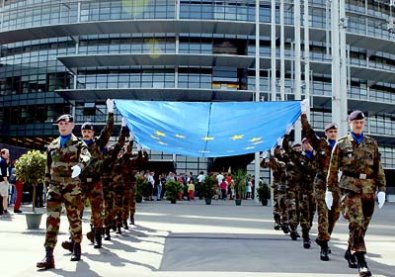
From Clara Marina O’Donnell, the Center for European Reform: Britain and France must work with Poland to refocus the EU debate on military capabilities. Britain should adopt a more constructive stance towards operational headquarters and agree to explore the matter so long as other EU countries improve their armed forces beforehand.
Instead of asking EU officials to explore options for using Permanent Structured Co-operation to set up headquarters, London, Paris and Warsaw should try to use PESCO to add momentum to the EU’s pooling and sharing efforts. As discussed earlier, the pull of a core defence group has managed to trigger reforms from EU ministries of defence in the past. So the UK, France and Poland should convince their EU partners to set up a core defence group based on two
qualifying criteria: EU governments must have a minimum threshold of deployable forces, and they must commit to offsetting their current budget cuts through at least one joint-effort with neighbours.
In addition, Britain and France should fully support some of Warsaw’s other ideas to strengthen CSDP, in particular those designed to make it easier to call upon EU battlegroups. Warsaw has notably suggested that a civilian component should be added to the combat units so that battlegroups could contribute more effectively to crises which require significant coordination between civilians and the military. Another welcome Polish suggestion is to encourage EU member-states which form a multinational battlegroup to keep the same formations in the future.
Currently battlegroups are often made up of contributions from several EU countries. But when the battlegroup’s rotation period ends, it is often disbanded and some of the experience gained by member-states’ armed forces from training together is lost. This could be avoided if EU countries kept the same partners for several battlegroup rotations.
London and Paris should also work with Warsaw to encourage member-states to use the EDA to its full potential as they explore initiatives for ‘pooling and sharing’. The EDA will only be able to help EU countries identify cost-saving projects if governments engage with it – something they have often failed to do in the past. London and Paris should also encourage
their neighbours to use the EDA to help them manage some of the cost-saving projects once they have been identified. In light of the complexities of large multilateral programmes, governments will be keen to pursue many pooling and sharing efforts bilaterally.
But for the most expensive capabilities – such as strategic airlift – many governments will still at times need to work within wider groups. And the EDA can offer a helpful framework to launch those larger joint programmes, particularly for pieces of military equipment for which the US has limited interest in collaborating, such as some aspects of satellite communications. Britain and France should also work with their EU partners to strengthen the EDA’s efforts in liberalising the European defence market.
Finally, the British and French governments should collaborate with Poland and the EU institutions to set up credible CSDP missions to assist the new governments in Tunisia, Egypt, and Libya – if requested to do so. Such assistance could take the form of advice on reforming the security services and the judicial system, or even peacekeeping. Certain member-states will baulk at the prospect of deploying new EU missions at a time of budgetary austerity. But the EU has valuable experience in police training and judicial reform. And it would be a much cheaper way of upholding European security than standing back and running the risk of its southern neighbourhood drifting into chaos.
CSDP will not lead to a dramatic change in European armed forces in the near future. But over the last decade, EU defence co-operation has spurred European countries into becoming somewhat more active in defence. And at a time of significant cutbacks in military spending on both sides of the Atlantic, even modest improvements to European military capabilities will be better than none.
Clara Marina O’Donnell is a research fellow at the Centre for European Reform and a non resident fellow at the Brookings Institution. (photo: Cafe Babel) (via Real Clear World)
Image: cafe%20babel%207%2011%2011%20EU%20defense_0.jpg
